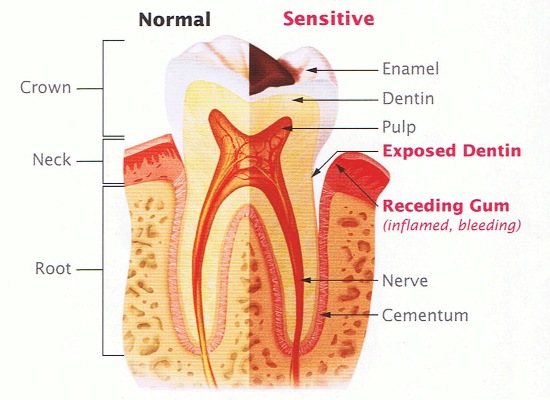What is Tooth Sensitivity?
Friday Mar 12th, 2021
Definition:
Tooth sensitivity is a common name for dentin hypersensitivity or root sensitivity. If hot, cold, sweet or very acidic foods and drinks, or breathing in cold air, makes your teeth or a tooth sensitive or painful then you have sensitive teeth.
Dentin hypersensitivity is dental pain which is sharp in character and of short duration, arising from exposed dentin surfaces in response to stimuli, typically thermal, evaporative, tactile, osmotic, chemical or electrical; and which cannot be ascribed to any other dental disease.
A degree of dentin sensitivity is normal, but pain is not usually experienced in everyday activities like drinking a cooled drink. Therefore, although the terms dentin sensitivity and sensitive dentin are used interchangeably to refer to dental hypersensitivity, the latter term is the most accurate.
Causes:
Tooth sensitivity is caused by the gradual exposure of the softer part of your tooth that lies under the tooth enamel, called “dentine”.
Dentine has tiny tubes (‘tubules’) that lead to the nerve and are filled with fluid. Eating or drinking foods and drinks that are hot, cold or sweet can cause a change in fluid movement. This fluid movement causes the nerve endings to react in response, triggering a short, sharp pain.
Some of the most common causes of sensitive teeth include:
Brushing: Brushing shortly after acid challenge can cause the enamel to be more easily worn away, as during this time the enamel is softened and more vulnerable. Brushing too vigorously can also cause receding gums, causing further exposure of the dentine.
Gum Disease: Gum disease (also known as gingivitis) causes inflamed and sore gum tissue. If left untreated, gingivitis can lead to periodontitis. Periodontitis is when gum disease gets worse and damages the tissues and bone that support the teeth. One sign of periodontitis is sensitive teeth, as the receding gums leave dentine exposed.
Teeth Grinding: If you grind your teeth when you sleep or during the day, or if you clench your teeth, you may be wearing down enamel and exposing the underlying dentine layer of your tooth.
Receding Gums: Receding gums can be caused by conditions such as gum disease, which can expose the tooth’s dentine and cause sensitivity. Brushing too vigorously can also cause receding gums.
Treatment:
Depending on your level of tooth sensitivity, you may try various over-the-counter or dentist-recommended treatments. Regardless of what you opt for, maintaining good oral hygiene is key to helping sensitive teeth.
The following are some at-home treatments:
- Desensitizing toothpaste. There are several brands of toothpaste for sensitive teeth available. Your dentist may recommend one or you may have to try different brands until you find the product that works for you. Be sure to use fluoridated toothpaste for sensitive teeth, not tartar-control toothpaste. Try spreading a thin layer of the desensitizing toothpaste on the exposed tooth roots before bed.
- Use a soft bristled toothbrush
- Avoid highly acidic foods
- Use a fluoridated mouthwash daily
- Avoid teeth grinding. You may consider getting a mouth guard.
The following are some dental procedures that may reduce tooth sensitivity:
- Bonding, crowns, or inlays. These may fix a tooth flaw or decay that is causing sensitivity.
- Fluoride gel or varnish
- Dentin sealers. These are applied to the exposed root surface, but they are not a permanent fix.
- Surgical gum graft. This will protect the root and reduce sensitivity if the gum tissue has eroded from the root.
- Root canal. This is a last-resort treatment for severe tooth sensitivity that has not been helped by other methods.




Post a comment